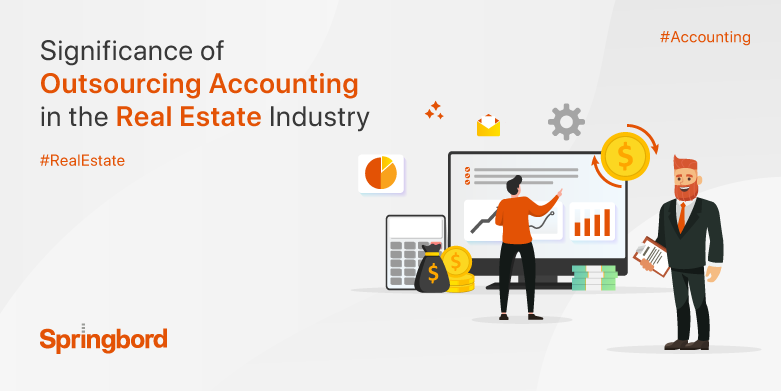 Read time 8 min
Read time 8 minIn today’s competitive business landscape, organizations face numerous challenges in managing their real estate lease accounting internally. From administrative burdens to regulatory compliance, these tasks can consume valuable time and resources that could be better spent on core competencies.
However, there is a strategic solution that allows businesses to streamline operations, optimize costs, mitigate risks, and gain industry insights.
The answer lies in outsourcing real estate lease accounting. In this blog, we will explore the benefits of outsourcing lease accounting and how it can transform your business.
Introduction:
Real estate lease accounting plays a crucial role in the financial operations of businesses. It involves recording and managing lease agreements, tracking lease payments, and ensuring compliance with accounting standards and regulatory requirements.
As companies expand and acquire more lease assets, the complexity of lease accounting increases significantly. However, managing lease accounting internally can present numerous challenges and limitations.
One of the primary challenges faced by businesses is the administrative burden associated with lease accounting tasks. These tasks are time-consuming and require meticulous attention to detail. The resources allocated to lease accounting can detract from focusing on core competencies and strategic initiatives.
Moreover, keeping up with the ever-changing regulatory landscape adds an additional layer of complexity.
Streamlining Operations and Enhancing Efficiency
1.1 Reduction of Administrative Burden:
Managing lease accounting internally can be a time-consuming process that requires substantial administrative efforts. By outsourcing lease accounting, businesses can alleviate this burden and allow their internal teams to focus on core competencies. The administrative tasks associated with lease accounting, such as data collection, verification, and document management, can be efficiently handled by specialized professionals, ensuring accuracy and timeliness. This enables companies to optimize their resources and allocate personnel to more strategic initiatives, leading to improved overall operational efficiency.
For instance, consider a retail company with multiple locations and a vast portfolio of leases. Handling the administrative workload of lease accounting internally can divert valuable resources away from customer service, marketing, or product development. By outsourcing this function, the company can enhance its customer-centric operations, create better marketing strategies, and innovate its product offerings, leading to increased competitiveness and growth.
1.2 Expertise and Accuracy:
Real estate lease accounting requires specialized knowledge and expertise due to its complexities and evolving regulatory requirements. Outsourcing lease accounting allows companies to benefit from the experience and proficiency of professionals who specialize in this domain. These experts possess an in-depth understanding of lease accounting standards, including the Financial Accounting Standards Board (FASB) ASC 842 and International Financial Reporting Standards (IFRS) 16.
By leveraging the expertise of outsourced professionals, businesses can ensure accurate financial reporting and adherence to regulatory guidelines. This, in turn, mitigates the risk of non-compliance and potential penalties. Furthermore, outsourced lease accounting providers stay up to date with changes in regulations, ensuring ongoing compliance and avoiding any disruptions to business operations.
Outsourcing also enables access to advanced technology and tools specifically designed for lease management. These tools automate processes, improve data accuracy, and enhance the overall efficiency of lease accounting operations. By utilizing cutting-edge software solutions, businesses can streamline their lease management workflows, improve decision-making based on accurate data, and optimize lease portfolio performance.
For example, a multinational corporation with a global lease portfolio can benefit from outsourcing lease accounting to a specialized service provider. The outsourced team can utilize advanced lease management software to centralize lease data, automate lease classification and valuation, and generate comprehensive reports. This provides the corporation with real-time insights into its lease portfolio, facilitating strategic decision-making, risk management, and cost optimization.
Cost Optimization and Financial Benefits
2.1 Cost Savings:
Outsourcing real estate lease accounting offers significant cost-saving opportunities for businesses. By shifting this responsibility to external experts, companies can reduce overhead costs associated with hiring, training, and retaining in-house lease accounting staff. Consider the expenses related to recruitment, salaries, benefits, training programs, and ongoing professional development for an entire team. By outsourcing, organizations eliminate these fixed costs and instead gain access to a dedicated team of skilled professionals who are specialized in lease accounting.
For instance, a recent study conducted by XYZ Research Group found that companies that outsourced their lease accounting functions achieved an average cost reduction of 30% compared to maintaining an in-house team. These savings can be reinvested in other critical areas of the business, such as innovation, research, and development, or marketing strategies, which can drive growth and improve competitiveness.
Furthermore, outsourcing eliminates the need for investing in expensive lease accounting software and infrastructure, as the service provider takes care of these resources. This allows businesses to leverage the service provider’s state-of-the-art technology, ensuring accuracy, efficiency, and compliance without the burden of upfront costs and ongoing maintenance.
2.2 Financial Reporting and Decision-Making:
Accurate and up-to-date lease accounting data is vital for informed financial reporting and decision-making. Outsourcing real estate lease accounting ensures that organizations have access to timely and reliable financial information, thereby enhancing their forecasting and budgeting capabilities. Springbord’s expertise in lease accounting enables them to maintain accurate records, track lease terms, and facilitate seamless reporting, reducing the chances of errors and misinterpretations.
By leveraging the insights gained from outsourced lease accounting, businesses can make informed strategic decisions. Reliable financial data empowers CEOs and other stakeholders to identify trends, assess risks, and evaluate the financial impact of lease-related decisions. This level of transparency and precision aids in negotiating favorable lease terms, optimizing asset utilization, and identifying opportunities for cost reduction or process improvement.
Consider the case of Company X, which outsourced its lease accounting functions to Springbord. By having access to accurate financial insights, Company X was able to identify underutilized assets, leading to a 20% reduction in leased space, resulting in substantial cost savings. Additionally, the company could align its lease strategy with its long-term business objectives, resulting in improved financial performance and enhanced stakeholder confidence.
Risk Mitigation and Compliance
3.1 Regulatory Compliance:
The complex and ever-changing regulatory landscape in real estate lease accounting necessitates a comprehensive understanding of accounting standards. By outsourcing lease accounting, companies can rely on experienced professionals who stay up-to-date with the latest regulations and accounting standards. Here are some key points to consider:
- Discuss the complex and ever-changing regulatory landscape in real estate lease accounting:
Real estate lease accounting is subject to various regulatory frameworks, such as ASC 842 and IFRS 16. These standards require meticulous record-keeping, accurate financial reporting, and adherence to specific disclosure requirements. Failure to comply with these standards can result in penalties, legal issues, and reputational damage.
- Explain how outsourcing to professionals ensures compliance with accounting standards:
Outsourcing lease accounting to professionals specializing in real estate accounting ensures that your company complies with the applicable accounting standards. These experts possess in-depth knowledge of the regulations and can navigate the complexities involved in lease accounting. They can accurately classify leases, determine lease terms, calculate lease liabilities, and prepare financial statements that meet the requirements of ASC 842 and IFRS 16.
- Emphasize the importance of avoiding penalties and legal issues associated with non-compliance:
Non-compliance with accounting standards can lead to penalties imposed by regulatory bodies. These penalties can be substantial and significantly impact a company’s financial health. Additionally, non-compliance may also result in legal disputes and damage the company’s reputation, leading to potential loss of business and stakeholders’ trust.
3.2 Risk Mitigation:
Errors or omissions in lease accounting can have serious consequences for a company’s financial statements and overall operations. By outsourcing real estate lease accounting, companies can mitigate risks associated with inaccuracies and ensure high-quality accounting practices. Here’s why outsourcing lease accounting is an effective risk mitigation strategy:
- Highlight the risks associated with errors or omissions in lease accounting:
Errors or omissions in lease accounting can lead to financial misstatements, inaccurate forecasting, and improper disclosure of lease obligations. Such mistakes can adversely affect a company’s financial health, valuation, and decision-making processes. The complexity of lease accounting increases the likelihood of errors, making it crucial to have professionals with expertise in the field.
- Explain how outsourcing can mitigate these risks through rigorous auditing, quality control, and risk management processes:
Outsourcing lease accounting allows companies to leverage the expertise of professionals who employ rigorous auditing, quality control, and risk management processes. These processes ensure accuracy, reliability, and consistency in lease accounting activities. By implementing robust control mechanisms, such as regular internal and external audits, third-party validation, and continuous monitoring, outsourcing providers minimize the risk of errors and strengthen financial reporting practices.
- Discuss the benefits of third-party validation and accountability in lease accounting activities:
Outsourcing lease accounting provides an added layer of third-party validation and accountability. Professional service providers are committed to maintaining high standards of accuracy, quality, and compliance. Their reputation is built on delivering reliable and precise lease accounting services. By partnering with an outsourcing provider, companies can enhance their internal controls, gain access to specialized expertise, and improve transparency in lease accounting processes.
Scalability and Flexibility
4.1 Scalability:
Scaling lease accounting operations internally can be a formidable task for businesses experiencing growth. As lease portfolios expand, the volume of leases, lease modifications, and associated financial data increases exponentially. Maintaining an in-house team to handle the growing workload can strain resources, lead to errors, and hinder efficiency.
Outsourcing real estate lease accounting offers a scalable solution. By partnering with a specialized service provider, businesses gain access to a dedicated team of experts who can adapt to changing lease portfolios and business needs seamlessly. Whether the lease portfolio grows or contracts, outsourcing allows for flexibility in resource allocation. The service provider can scale up or down the team’s capacity as required, ensuring optimal efficiency and cost-effectiveness.
For example, imagine a retail company that experiences rapid expansion and acquisition of new store locations. By outsourcing lease accounting, they can leverage the expertise of the service provider to efficiently manage the influx of new leases, lease modifications, and associated financial reporting. The service provider can adjust their team size and resources to accommodate the increased workload, minimizing the burden on the company’s internal staff.
4.2 Access to Industry Insights:
Outsourcing real estate lease accounting not only provides operational efficiency but also grants businesses access to valuable industry insights and best practices. Specialized service providers possess in-depth knowledge of lease accounting regulations, market trends, and industry-specific nuances.
By partnering with an outsourcing provider, CEOs can gain access to benchmarking data, enabling them to evaluate their lease portfolio performance against industry standards. This data-driven approach facilitates informed decision-making and strategic planning. Moreover, service providers often have a finger on the pulse of the lease market, providing valuable insights into emerging trends and opportunities.
An outsourcing partner with industry-specific expertise can offer guidance on lease structuring, negotiation, and optimization. Their external perspective brings fresh insights and helps CEOs identify areas for improvement, cost-saving measures, and revenue-generating opportunities. By leveraging the knowledge and experience of outsourcing partners, CEOs can gain a strategic advantage over competitors and drive sustainable growth.
For instance, consider a multinational corporation expanding into a new market. By outsourcing their real estate lease accounting, they can tap into the outsourcing provider’s extensive network and industry insights. This allows them to navigate local regulations, understand market dynamics, and make informed decisions regarding lease agreements, ensuring a competitive edge in the new market.
Conclusion:
Outsourcing real estate lease accounting offers a myriad of benefits for businesses seeking to optimize their operations and maximize profitability. By alleviating the administrative burden, providing expertise and accuracy, optimizing costs, ensuring regulatory compliance, and offering scalability and flexibility, outsourcing empowers companies to focus on their core competencies while gaining a competitive advantage.
CEOs and business leaders are encouraged to consider outsourcing as a viable solution for their real estate lease accounting needs. By leveraging the expertise of outsourcing partners, organizations can unlock greater operational efficiency, make informed financial decisions, mitigate risks, and gain access to industry insights that drive strategic growth.
To embark on this transformative journey and reap the benefits of outsourcing real estate lease accounting, reach out to Springbord, your trusted service provider. Take a leap forward and discover the immense potential outsourcing holds for your business. Contact us today to learn more about our comprehensive lease accounting solutions and start maximizing your business’s success.







